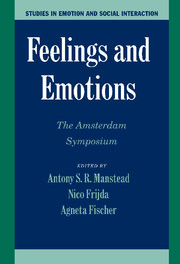Book contents
- Frontmatter
- Contents
- List of Contributors
- 1 Introduction
- PART I THE NATURE OF FEELINGS AND EMOTIONS
- PART II BASIC PSYCHOLOGICAL PROCESSES IN FEELINGS AND EMOTIONS
- PART III FEELINGS AND EMOTIONS: THE PLACE OF PLEASURE
- 14 The Affect System
- 15 Pleasure, Unfelt Affect, and Irrational Desire
- 16 Some Perspectives on Positive Feelings and Emotions
- 17 Pleasure, Utility, and Choice
- PART IV FEELINGS AND EMOTIONS IN THEIR SOCIOCULTURAL CONTEXT
- PART V FEELINGS, EMOTIONS, AND MORALITY
- Subject Index
- Author Index
- Plate section
- References
16 - Some Perspectives on Positive Feelings and Emotions
Positive Affect Facilitates Thinking and Problem Solving
Published online by Cambridge University Press: 05 June 2012
- Frontmatter
- Contents
- List of Contributors
- 1 Introduction
- PART I THE NATURE OF FEELINGS AND EMOTIONS
- PART II BASIC PSYCHOLOGICAL PROCESSES IN FEELINGS AND EMOTIONS
- PART III FEELINGS AND EMOTIONS: THE PLACE OF PLEASURE
- 14 The Affect System
- 15 Pleasure, Unfelt Affect, and Irrational Desire
- 16 Some Perspectives on Positive Feelings and Emotions
- 17 Pleasure, Utility, and Choice
- PART IV FEELINGS AND EMOTIONS IN THEIR SOCIOCULTURAL CONTEXT
- PART V FEELINGS, EMOTIONS, AND MORALITY
- Subject Index
- Author Index
- Plate section
- References
Summary
ABSTRACT
The work reviewed in this chapter indicates that positive affect facilitates careful, thorough thinking and problem solving, and promotes a flexible, responsive approach to situations that fosters new learning as well as utilization of existing knowledge. Evidence indicates that these processes also facilitate pro-social behavior and flexibility in social perception. In addition, research has shown that positive affect increases some kinds of motivation by influencing some of its components as well. Thus, the chapter argues for a conceptualization that integrates affect, cognition, and behavior/motivation (the traditional trichotomy of mind) and recognizes the fact that they mutually influence one another. The chapter argues against the common assumption that affect and cognition are separate, competing systems or approaches, and shows, instead, that they have mutual influence and are subject to similar processes. Likewise, it is shown that motives arising out of affect need not be more compelling than motives arising from other sources. The data suggest, further, that positive and negative affect, rather than being opposites, have distinct effects. A neuropsychological theory of the influence of positive affect on cognitive functioning is discussed, and the chapter calls attention to the potential benefits to be had from integrating the neuropsychological, behavioral, and cognitive levels of analysis in studying affect.
- Type
- Chapter
- Information
- Feelings and EmotionsThe Amsterdam Symposium, pp. 263 - 281Publisher: Cambridge University PressPrint publication year: 2004
References
- 69
- Cited by

